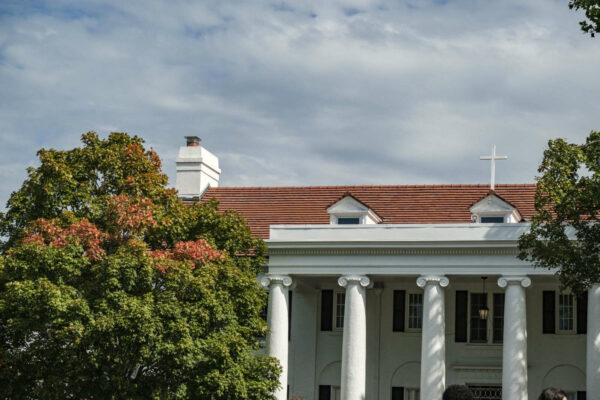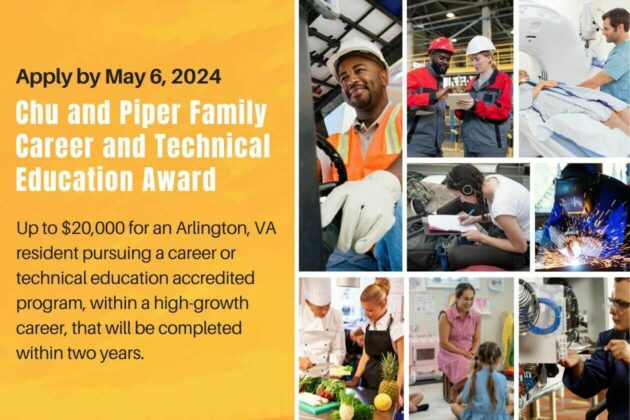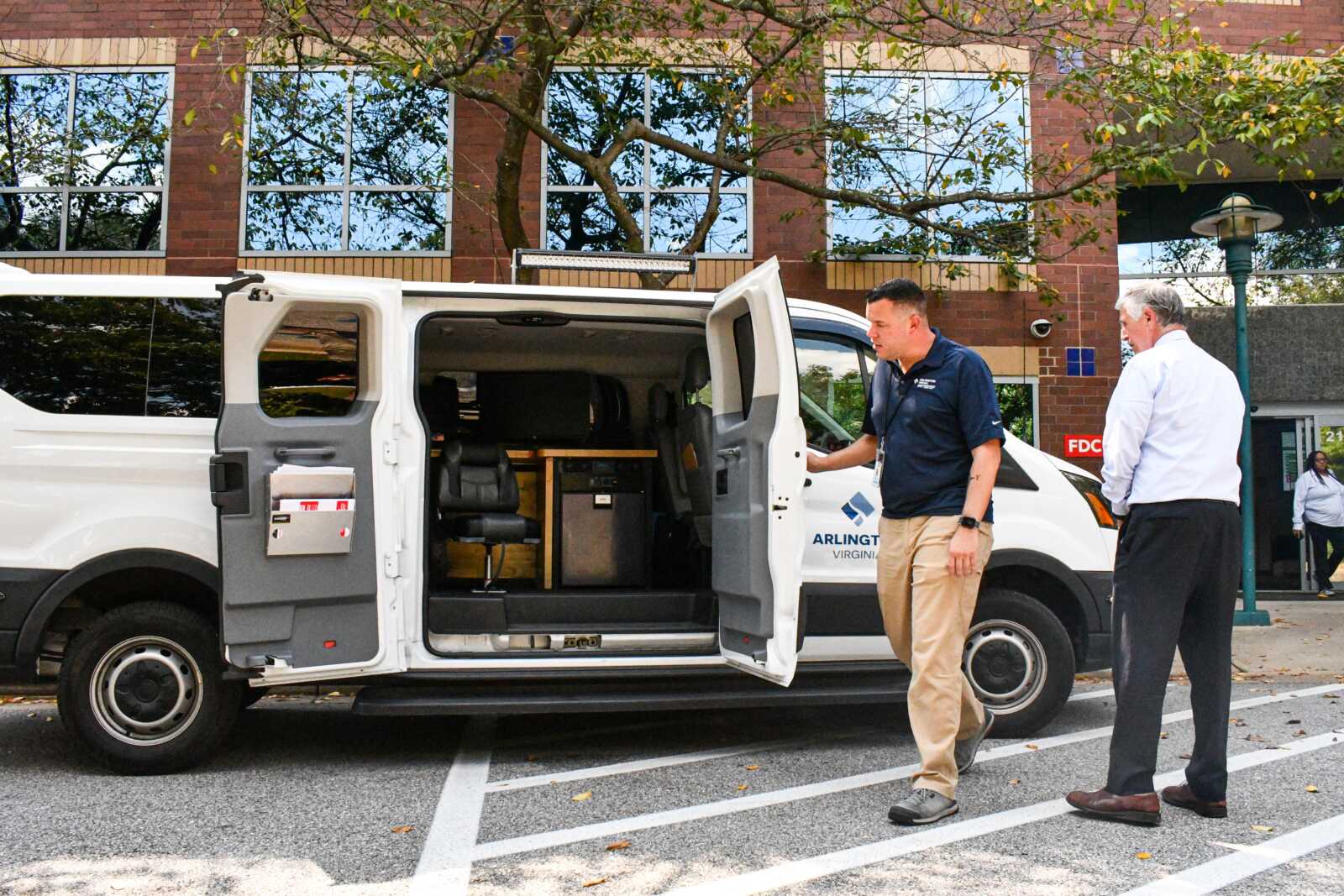
(Updated at 4:10 p.m.) Marymount University is cutting several degrees to save money, but in the process has angered some in the school’s community.
In a bid to cut fruitless vine branches, the school is eliminating 10 degrees and programs — mostly in the humanities, including theology and English.
The looming decision has roiled the school community, including current and former students, faculty and even a national association of historians.
In a letter shared with ARLnow, the Catholic university’s president Irma Becerra said Marymount will eliminate bachelor’s degrees in theology and religious studies, philosophy, mathematics, art, history, sociology, English, economics and secondary education, as well as a master’s program in English and the humanities.
“Over the long term, it would be irresponsible to sustain majors [and] programs with consistently low enrollment, low graduation rates, and lack of potential for growth,” Becerra said. “Recommendations and decisions on programs marked for elimination are based on clear evidence of student choices and behavior over time.”
Becerra said the savings from ending programs for these subjects — to which Catholic thought has contributed for more than a millennium — would support more popular majors. Other savings would come from a voluntary retirement program.
The attention to the university’s budget comes after what appeared to be a fruitful 2022 for the Catholic school, with higher enrollment rates, new softball and wrestling teams and new majors. It was even mulling building a new athletic facility.
Reaction from the school community has been swift. Alumni started a petition and the Student Government Association and the American Historical Association have sent letters to Becerra pleading for her to reverse course. Long emails blasting this decision have poured into ARLnow today (Friday) from current and former students and faculty.
“This is unnecessary and a real threat to shared governance and our faculty’s ability to serve our students well,” said Holly Karapetkova, English and composition professor and Arlington County’s poet laureate. “That’s what we’re all here for and we know the programs are valuable to the students.”
She added that these programs benefit the entire student body by supporting campus publications and regularly hosting events.
“The consequences of this ‘academic realignment’ have not been thought through,” said Adam Kovach, a Marymount philosophy professor. “The administration claims program closures will allow the university to shift resources to grow programs with larger enrollments and to create innovative new programs, but this is all vague and aspirational.”
“We have not heard any definite plan for how to grow,” Kovach continued. “We have not seen evidence these changes will lead to cost savings that could just as well be achieved without closing programs. The strategy appears to be, wreck first and find out what to build later.”
A report shared with ARLnow from the Director of the School of Humanities shows there are around 91 students majoring in art, English, history, math, philosophy, sociology and religious studies. Some 93% said they would have gone elsewhere had these programs not existed, taking some $2.7 million in room and board and tuition fees with them.
Alumna Elyssa Giordano said the comments on the petition, which had more than 400 signatures as of 4 p.m. Friday, “express how disappointed people are with this decision,” adding that while 300 people signing a petition normally “is not a huge deal, it is for a small school where total enrollment ranges from 1,500-3,000.”
Ethan Reed, a sophomore and the president of the school’s College Democrats, predicted “this will only hurt our community with an even smaller population and will further harm the social sciences and sociology programs at the school.”
Of all the times to cut history, said alumna Jordana Taylor, now is not it.
“We are currently experiencing an environment where the study of history at lower grade levels is being challenged and considered controversial,” she said. “Colleges and universities should bear the responsibility of creating educational environments where students can take those questions and fill in the gaps where their K-12 learning may not have been able to challenge them.”
Alumna and Bishop O’Connell High School social studies teacher Chesney Allgood said this business decision “is a clear demotion of the humanities in the school’s curriculum in favor of more profitable programming available at the school.”
This bet may not pay off, said Chris Snyder, who taught at Marymount for 15 years, chaired its history and politics department and directed its honors program. He said many smaller colleges and universities with small endowments and falling enrollments have cut liberal arts programming to save some money and to respond to career choices in STEM fields.
“Schools that do this are also taking a big gamble that certain fields will always have jobs available for their graduates, but one has only to look at the petroleum industry and high-tech companies like Google to see that things can change very quickly, jobs can dry up and thousands of peoples can get laid off even with their specialized credentials,” he said.
He continued that “liberal arts majors continue to be in demand in many fields because they have ‘soft skills’ like effective writing and critical thinking and they are adaptable to changes in the marketplace.”
Axios reported earlier this month, meanwhile, that the humanities are mounting a “comeback” after years of cuts, suggesting that Marymount may be riding the tail end of a trend that’s in the process of reversing.
When the University of California, Berkeley, reported an uptick in humanities majors this academic year, there was elation — and shock — at the prospect of a trend reversal.
- The number of first-year Berkeley students declaring majors in the arts and humanities — which includes English, history, languages, philosophy and media studies — was up 121% over last year.
- The number of high schoolers applying to Berkeley with the intention of studying humanities was up 43.2% from five years ago, and up 73% vs. 10 years ago.
“Students are turning to the arts and humanities as a way to make sense of our current moment,” Sara Guyer, dean of Berkeley’s division of arts and humanities and director of the World Humanities Report, told the university’s news service.
- The University of Arizona’s College of Humanities has seen a 33% increase in student majors since 2016.
- A handful of other schools — such as Arizona State University and the University of Washington — have also seen a rise in students declaring humanities majors.
Student government president Ashly Trejo Mejia said the move will alter the school’s foundation and identity.
“The Religious Sacred Heart of Mary built this school upon the values of faith, understanding of others, and a deep passion for education,” Mejia wrote to Becerra.
The American Historical Association, a national body supporting historians, called the decision “short-sighted.”
“We urge Marymount University to reconsider this decision, which undermines the university’s commitment to ‘intellectual curiosity, service to others, and a global perspective,” wrote Executive Director James Grossman. “Marymount students deserve to have the opportunity to major in fields like history that prepare them not just for a job but for responsible leadership and citizenship.”
In late January, when the cuts were first recommended, a two-thirds majority of faculty approved an alternative plan: cut a master’s program in English and the humanities as well as a Bachelors of Arts in economics — keeping a bachelors of science in economics — and revise six majors to achieve savings. Becerra rejected the proposal in a letter on Wednesday.
Faculty say overturning this decision oversteps a line.
“Marymount’s administration has rejected faculty and student input at every stage of the process,” said Kovach. “This inflexibility is regrettable because our faculty are reasonable, talented people and we are committed to Marymount’s success in the long term. The administration would benefit from cooperating with us.”
Karapetkova worries Marymount will run afoul of its accrediting institution, which requires programmatic changes like this to have “faculty involvement in the planning and approval of the change.” At best, faculty are at odds over the plan, given that a task force made of some faculty came up with the recommendations that other faculty later rejected.
In a statement to ARLnow, below, Marymount said its “mission is unchanged.”
We will continue to prepare students for in-demand careers by offering them a robust education grounded in the liberal arts. However, Marymount is indeed making changes to better position the University for long-term growth and success. One of those is investing in programs with growth potential, aligned with student demand, to give Marymount a competitive advantage.
Supported by definitive research and a Faculty Advisory Committee, the Academic Policy, Budget and Planning (APBP) Committee recommended the elimination of nine majors and one graduate program which had consistently low enrollment and graduation rates. Marymount will reallocate resources from those programs to others that better serve our students and reflect their interests. It’s important to note that current Marymount students in those programs are not affected and their required coursework will be provided without disruption as they complete their degrees. Also, while these subjects will no longer be offered as majors, the coursework — particularly in the humanities — is central to our mission and identity as a Catholic university and will remain part of Marymount’s core curriculum.
As Marymount assesses the evolving higher education landscape, we are called to constantly refine our offerings and approach. While these specific changes are not financially driven, they will provide the University the opportunity to redeploy resources to better serve students and areas of growth. We believe investing in programs that appeal to students and prepare them for highly sought-after professions is not only our mission but our responsibility.
Recent Stories

For Immediate Release
Progress for All Announces Inaugural Black Men Vote Virtual Town Hall
Date: April 19, 2024
Contact: Marc M. M. Peters

The Award is available to recent high school graduates and non-traditional students (see the application for more details). Each recipient may be awarded up to $20,000. Applicants are required to submit an online application form as well as a short video application.
The applicant must be an Arlington resident pursuing a career or technical education accredited program, within a high-growth career, that will be completed within two years.
The careers and programs include, but are not limited to:
-
Audio, Video, and Sound Engineering Technicians
-
Broadcast Technicians
-
Commercial Drivers
-
Culinary Arts
-
Early Childcare Education
-
Healthcare
-
Information Technology and Computer Science
-
Manufacturing and Skilled Trades (including welding, auto and aviation mechanics and technicians)
-
Public Safety
ACFCU’s Free Homebuying 101 Webinar: Steps to Getting Pre-Approved
Are you ready to jump into homeownership, or have you started considering it but don’t know where to start?
Financial preparation is key when thinking about purchasing your first home and the first step to getting pre-approved. Join ACFCU for
Sweeney Todd
A victim of a gross injustice that robbed him of his wife and child, Sweeney Todd sets about exacting a terrible revenge on society.







